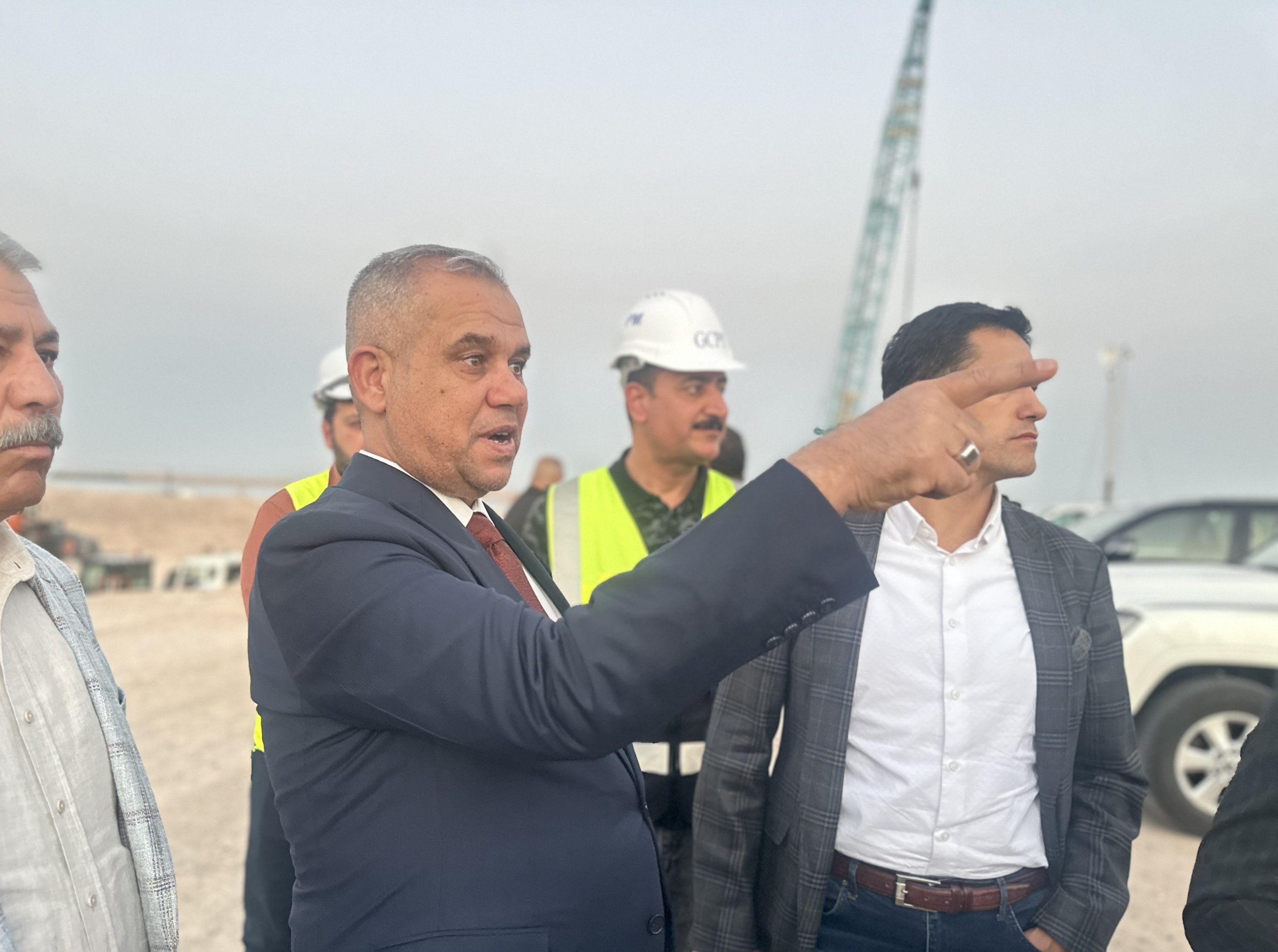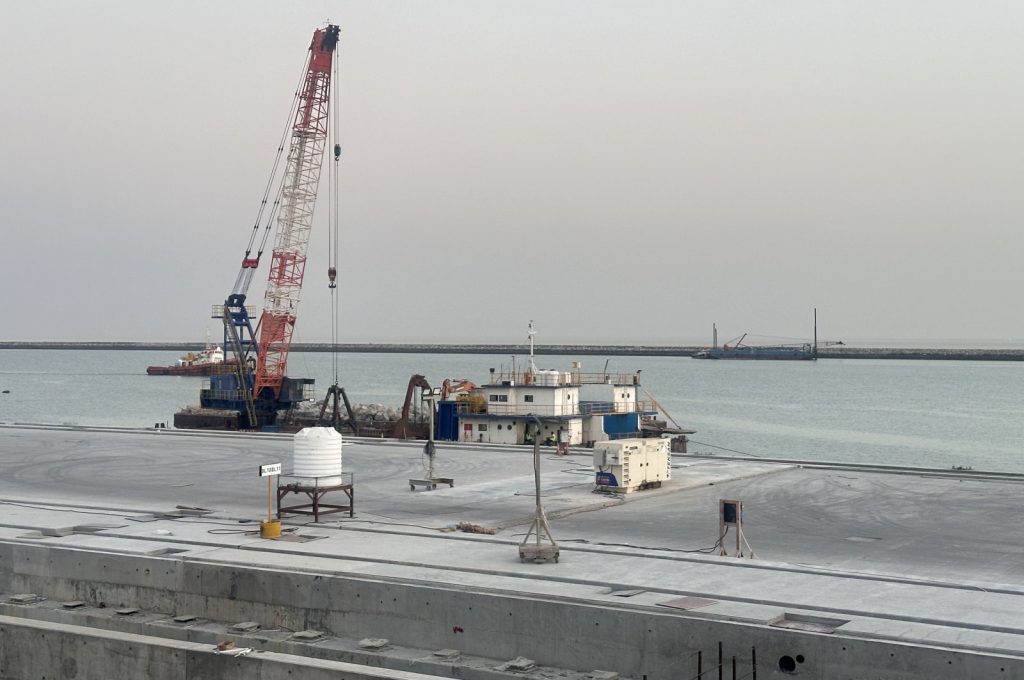This week, upon an invitation by Iraqi Prime Minister Mohammed S. Al Sudani, I visited the Grand Al-Faw port, which is projected to constitute the heart of the Development Road project, which will link the East to the West.
After a road trip from the capital to the southern Basra province, we entered the huge area of 54 square kilometers (33.5 square miles) devoted to the port town. A long, curvy road is to be followed until one can reach the seaside. Farhan al-Fartousi, director general of the General Company for Ports of Iraq, accompanied us, showing the different features and facilities to be built within the area.
The port, built by the South Korean Daewoo company with an agreement worth approximately $5 billion, is located at the mouth of the Shatt al-Arab, where the Euphrates and Tigris rivers meet before flowing into the sea.
Al-Faw and its surroundings will host oil and gas refineries, industrial sites, as well as sites for tourism among other facilities while having a capacity of 90 docks. It is expected to bring a new spirit to Basra and be a center of trade and development.
While after the first phase of mid-2025, the port will start to operate, its completion will follow phases of the years 2030, 2038 and lastly 2050, when Al-Faw will be completely ready with its facilities.
The project, which is expected to become the Middle East’s biggest port, in fact, points to a new vision in Iraq, which Sudani has put forth. Plagued by wars, conflicts and, most recently, the terror of Daesh, Baghdad did not have the chance to exit the spiral of warfare and invest in its development. However, now that the country has entered a relative phase of stability, the central government has the chance to strengthen institutions, draw investors and engage in infrastructure projects. Sustaining a stable atmosphere is key if these goals are to be achieved.
The government is quite aware that unless development and stability are achieved, the country’s population will start to feel restless. More than half of Iraq’s 44 million population is under the age of 25 – a huge potential if used rightly. Most of them grew up in a period of instability and yearn for their country to catch up with international standards in all fields. With almost half the population working as civil servants with the government, employment is already a huge problem in the country. Thus, a project such as the Development Road, which will create significant numbers of jobs and divert the country’s economy from being fully dependent on oil incomes, can bring prosperity to Iraq.

The Development Road and its components would also mark a significant departure from the country’s existing aged transport network. Iraq’s government envisions high-speed trains moving goods and passengers up to 300 kilometers per hour, links to local industry hubs and an energy component that could include oil and gas pipelines.
The road will pass through 11 cities: Basra, Najaf, Kerbela, Salahuddin, Samarra, Duhok, Mosul, Diwaniyah, Babylon, Nasiriyah and Fishkhabur. Thus, all these provinces will benefit from the project. Ten of these cities have already given the government approval.
Bypassing the KRG
Passing 4.5 kilometers through Duhok, the project will partly enter the Kurdistan Regional Government (KRG). Indeed, Irbil proposed that the project took a bigger part in the KRG. Yet Iraq’s Transportation Minister Razzaq Muhaibis al-Saadawi said that the proposals were submitted to the ministry’s council and the Italian consultancy firm that works on the road’s feasibility but were declined as the current route is superior economically. He mentioned that a delegation visited Irbil on the project two weeks ago. Irbil aimed for Kirkuk also to be involved in the route.
From Duhok, the road will go over Fishkhabur and reach the Turkish border through the planned Ovaköy border gate. While uncertainty continues between Irbil and Baghdad regarding the management of the new border gate planned to be established in Ovaköy within the scope of the project, al-Saadawi stated that negotiations on the management of the border gate will be held soon.
President Recep Tayyip Erdoğan during his return flight from the United Arab Emirates (UAE) and Egypt in February, pointed out that the KRG also had sensitivities when it came to the project. Erdoğan furthermore paid a visit to Irbil in April after signing an agreement on the Development Road Project with the UAE, Iraq and Qatar in Baghdad.
The project will constitute a new international corridor at a time of renewed conflict and clashes in the region, thus contributing to trade security. In the long haul, it presents opportunities for win-win cooperation in which Turkish companies can invest in several fields and create employment in Iraq. The project will put Ankara and Baghdad at the center of a vital trade corridor that has the potential to be linked to the Middle Corridor as well as China’s Belt and Road Initiative.


